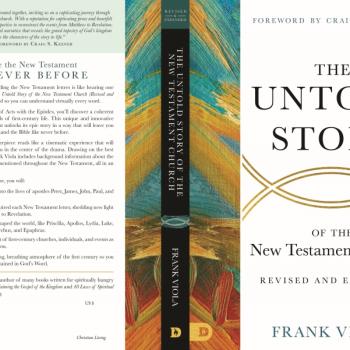 By Blake Ostler
By Blake Ostler
Addressing the future of Mormon theology is problematic on many fronts.
First, there are many in Mormonism who believe that it doesn't have any "theology." There are others, like BYU philosophy professor James Faulconer, who believe that although Mormonism may have some types of informal theology, the endeavor to develop any theology is either inherently dangerous to faith or otherwise a worthless project. Nevertheless, such "post-modern" skepticism, which denigrates development of such theological issues, is fundamentally at odds with Mormonism's commitment to continuity with the natural world and the inherent capacity of mortals to discover truth. However, it is clear that because Mormonism embraces "continuing revelation," any statement of theology is always subject to revision by any future revelations that may be received by the prophets of the Church.
This statement of the problem gives rise to one of the primary tasks of Mormon theology. Taking "theology" in its broadest sense as a faithful attempt to make sense of one's received faith within the culture in which one finds oneself, a primary task of Mormon theology in the future is to find the role of theological assessment of scripture and revelation and the value of coherent thought in Mormonism. More importantly, the task of defining what is authoritative in Mormon theology and what constitutes Mormon "doctrine" remain major tasks for the future. Various positions have been suggested to date.
Most Mormons appear to uncritically assume a more-or-less evangelical view of theology as a statement of a totalizing attempt at a coherent system of scriptural doctrine that elucidates a completed worldview. However, given the nature of Mormonism's open canon and its rejection of scriptural inerrancy, such a view of theology and, more particularly revelation, does not seem to be sustainable within Mormonism.
Nathan Oman has suggested that Mormonism embraces a view of theology something like a judicial assessment based upon many sources of common law. (Click here to read more on Mormon doctrinal sources and the question of authority). In his view, Mormonism assesses the many sources of the Mormon scriptures and statements by general authorities like a judge assesses the sources of common law. However, any such undertaking is necessarily subject to revision by further "judicial" decisions that may modify the common law.
I have suggested a view of revelation consisting of "creative co-participation" in which prophets necessarily provide revelation within the contexts of a particular linguistic structure, linguistic practice, and worldview. In addition, the sources of authority are to be assessed based upon a hierarchy of value beginning most authoritatively with the scriptures, non-canonized revelations, statements of Joseph Smith, the official statements of church authorities (such as First Presidency statements), and the Lectures on Faith, rounded out by the statements made by General Authorities in General Conference talks and elsewhere. Such an approach has much in common with Nathan Oman's proposed "common law" approach to assessing what constitutes Mormon doctrine and revelation.
The primary task of Mormon theology for the foreseeable future is to assess its relationship to naturalism and the scientific worldview. Many Mormons view God as located within and limited by our "particular universe," which began some fourteen billion years ago with the big bang and is thus subject to all of the limitations of natural law. Others see God as transcending the existing natural universe because God is the organizer not only of this universe, but of many others. God's relationship to the natural universe, whether God had a beginning of his divinity, and whether God is at the mercy of limitations of natural laws, remain major issues for Mormon thinkers to work out.
In addition, Mormon theology has the difficult task of elucidating how religious and spiritual knowledge are reliable, compared to empirical and technical knowledge gained through the scientific method and the assumptions of naturalism. To date, few Mormon thinkers have developed a consistent explanation of Mormon spiritual experiences and how they provide reliable knowledge. However, elucidating an epistemology of spiritual experiences within the Mormon tradition seems to be a primary task that must be undertaken to provide a basis of commitment to Mormonism. Mormonism has tended to simply adopt an uncritical fideism where believers simply accept the assertions of faith on faith and the validity of spiritual experience without critical thought.




